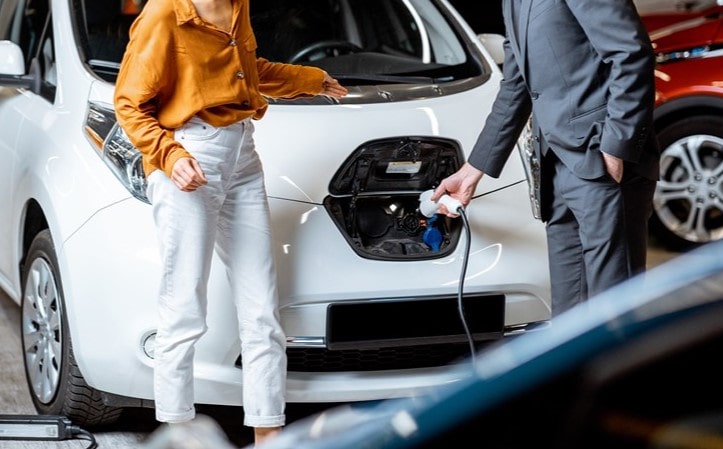Understanding Electric Cars Transportation is a cornerstone of modern life, yet the traditional combustion engine is losing its appeal. Gasoline and diesel-powered vehicles contribute significantly to pollution, while fully electric vehicles are swiftly emerging as the sustainable alternative. Electric cars, also known as EVs, produce zero emissions, making them a compelling choice for environmentally conscious consumers. Could your next vehicle be electric?

The Pros of Electric Cars:
Electric cars boast numerous advantages:
Environmental Friendliness:
One of the most significant benefits of electric cars is their positive impact on the environment. Unlike traditional vehicles, they produce no tailpipe emissions, contributing to cleaner air and a healthier planet.
Moreover, advancements in electric vehicle technology continue to enhance their eco-friendly credentials.
Cost Savings:
Owners of electric cars enjoy substantial savings on fuel and maintenance costs. With no need for gasoline and fewer moving parts than internal combustion engine vehicles, electric cars offer long-term financial benefits.
Additionally, bypassing gas station queues and the convenience of home charging further add to the allure of electric vehicles.
Performance:
Contrary to misconceptions, electric cars deliver impressive performance. Powered by electric motors, these vehicles offer instant torque, translating to swift acceleration and a thrilling driving experience. Models like the Tesla Model S Plaid exemplify the remarkable speed achievable by electric cars, showcasing their potential to redefine automotive performance standards.
Ease of Maintenance:
Maintaining electric cars is notably simpler compared to their gasoline counterparts. Electric motors require less frequent servicing, translating to reduced downtime and lower maintenance costs.
Furthermore, the absence of components like engine oil, transmission fluid, and spark plugs streamlines maintenance tasks, offering added convenience to electric car owners.
Optimized All-Wheel Drive:
Electric vehicles feature innovative all-wheel-drive systems that optimize performance and efficiency. Unlike traditional mechanical setups, electric cars distribute power to each axle through individual electric motors, enhancing traction and handling.
Cutting-edge solutions, such as those seen in the Kia EV6, ensure instantaneous power delivery and superior driving dynamics.
Enhanced Comfort and Space:
Electric cars prioritize passenger comfort and interior space. Designed with efficiency in mind, electric vehicle platforms maximize cabin room by positioning components strategically. The absence of bulky internal combustion engines results in a spacious interior, offering ample legroom and storage options.
Additionally, the quiet operation of electric cars contributes to a serene driving experience, ideal for urban environments.
Challenges Facing Electric Cars:
Despite their many benefits, electric cars face several challenges:
Charging Infrastructure:
The availability and accessibility of charging stations remain a concern for prospective electric car owners. While public charging networks continue to expand, some regions still lack adequat infrastructure.
However, installing a personal charging station at home can alleviate this issue, providing convenient access to reliable charging facilities.
Perception and Adoption:
Despite advancements in electric vehicle technology, widespread adoption faces resistance from consumers accustomed to traditional automobiles. Misconceptions regarding electric cars’ performance, range, and charging capabilities persist, hindering their acceptance.
Nevertheless, ongoing efforts to educate consumers and dispel myths are gradually shifting attitudes towards electric mobility.
Conclusion:
Electric cars represent a paradigm shift in automotive technology, offering a sustainable and efficient alternative to conventional vehicles. While challenges remain, the benefits of electric mobility are undeniable.
As awareness grows and infrastructure improves, electric cars are poised to reshape the automotive landscape, ushering in a cleaner and more sustainable future for transportation.









